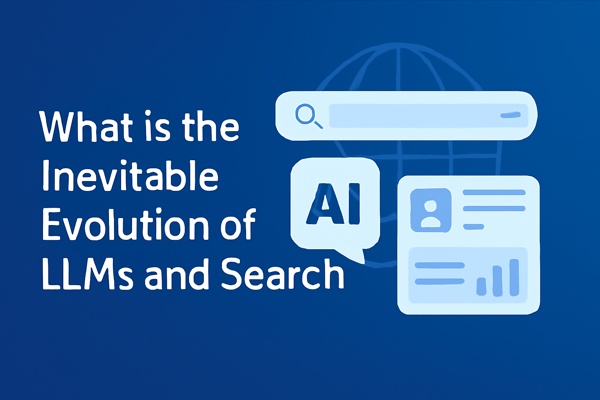Introduction
Ever wondered why you don’t always click through to a webpage when you Google something anymore? You type a question, hit enter, and boom you often see the answer right there. That’s because the way we search is changing, thanks to the rise of large language models. In this article we’ll explore what is the inevitable evolution of LLMs and search, why this matters right now, and how it’s reshaping everything from SEO to content strategy.
What exactly are large language models (LLMs) and how do they differ from traditional search?
Think of an LLM as a very advanced text-and-language engine that can understand, generate, and respond like a human (for example, in apps like ChatGPT or Google Gemini). Traditional search engines have been built around matching keywords and returning links. Now, LLMs are changing that dynamic. They’re designed to interpret context, user intent, and real-world language not just match words.
This matters because when we ask “what is the inevitable evolution of LLMs and search,” we’re really talking about how search will move from “keywords → webpages” to “intent → answer.”
Why is the evolution of LLMs and search inevitable now?
Because a couple of forces have converged: First, users are more comfortable asking full-questions or even speaking to search tools. Second, businesses, brands and content creators are noticing shifts like how optimized content for queries is no longer enough, because AI is pulling answers directly. For instance, AI‐driven search results are already disrupting traffic patterns.
How will search engines change with this evolution?
When you ask “How will search evolve?”, here’s the friendly breakdown:
- They’ll become conversational. Rather than you typing “best CRM software 2025”, you might ask “Which CRM software is best if I own a small business in India?” and get a direct synthesized answer.
- They’ll incorporate more context and fewer clicks. Because LLMs can summarise information, you may get your answer without visiting multiple websites. That forces content creators to rethink how they deliver value.
- They’ll lean heavily on structured data, entities, semantic relationships and authoritative content rather than just keyword-laden pages.
What should content creators and SEO professionals do in response?
Good question. If you’re writing content today (as you are), these are key shifts to embrace:
- Focus on search intent rather than just keywords. What is the reader really trying to find? Then answer it clearly.
- Structure your content so that an LLM or AI-powered search can easily extract answers: use Q&A style headings, include FAQs, make your key points bold or in bullets.
- Build topical authority. Don’t just write one isolated article on “LLMs and search” link it, expand it, show depth. That helps with the concept of entities and context over keywords.
- Use schema markup and make your site fast and clean. Because these models care less about fancy visuals and more about clarity and quick access.
What are the missing pieces of today’s search landscape what opportunities are there?
There are several under-leveraged opportunities:
- Action-oriented keywords: As one recent insight notes, many prompts to AI are commands (“generate a content calendar”, “create a project plan”) rather than just questions. Optimising for that can help.
- Multilingual/contextual understanding: International markets (like India) have different search behaviours; LLM-based search will lean into that.
- Zero-click traffic: Because AI might give the answer without a click, brands must think about how they show up within answer boxes or get mentioned even if not clicked.
- Entity-based content: Mentioning and explaining entities (technologies, people, brands) and their relationships helps signal relevance in this era.
- Structured knowledge vs. narrative fluff: AI prefers content that is direct, factual, clear. Narrative is still valuable but you need the facts clearly laid out.
FAQ
Q: Will keywords stop mattering altogether?
A: No they’ll still matter, but less as the core. Think of them as signposts for intent rather than the only way to optimise.
Q: Can I still rank high with traditional SEO tactics?
A: You might, but it gets tougher. Modern search will reward content that shows depth, authority and alignment with user intent more than just keyword-stuffing.
Q: How soon will this change affect my site?
A: It’s happening now. Some parts of search already show answers from AI/LLMs instead of typical link lists. You’ll want to start adapting today.
Q: Should I create content differently for voice search or conversational queries?
A: Yes. Write as if you’re answering a real person’s question. Use natural language, include follow-ups and context.
Q: Does this mean my blog posts need to be shorter or simpler?
A: Not necessarily shorter more clear. Use headings, bullet points, answer the question directly. You can still go deep, but ensure clarity and structure.
Conclusion
So, what is the inevitable evolution of LLMs and search? It’s a shift from keyword matching to intent understanding, from clicks to instant answers, from individual pages to connected topic networks. For creators and businesses that embrace this change now, it’s a huge opportunity. For those who stick with old tactics, it could be harder to keep up. If you’ve got thoughts, experiences, or questions about this shift drop a comment below, share your views and let’s chat.
